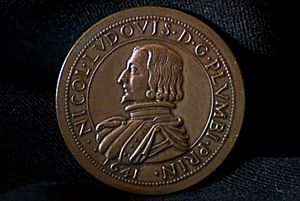Niccolò Ludovisi facts for kids
Niccolò I Ludovisi (born in 1610, died on December 25, 1664) was an important Italian prince. He ruled the Principality of Piombino from 1634 until his death. He was a powerful figure in his time.
Contents
Who Was Niccolò I Ludovisi?
His Family and Connections
Niccolò was the son of Orazio Ludovisi. His father was a nobleman from Bologna and a leader of the Papal Army. Niccolò's uncle was Pope Gregory XV, a very important religious leader. He also had a brother named Ludovico Ludovisi, who became a cardinal (a high-ranking church official).
His Marriages and Children
Niccolò Ludovisi was married three times during his life.
His first wife was Isabella Gesualdo. They married in 1622. Isabella was a princess from Venosa. They had one daughter, Lavinia, who sadly died when she was young.
In 1632, Niccolò married Polissena Appiani. Polissena was the daughter of Isabella Appiani, who was also a Princess of Piombino. Niccolò and Polissena had a son named Gregorio Filippo, who also died in childhood.
His third marriage was in 1644 to Costanza Pamphili. Costanza was the niece of Pope Innocent X. Her brother, Camillo Francesco Maria Pamphili, married Niccolò's niece, Olimpia Aldobrandini.
Niccolò and Costanza had several children:
- Giovan Battista (1647–1699), who became Prince of Piombino after his father.
- Olimpia (1656–1700), who became Princess of Piombino in 1700. She never married.
- Lavinia (1659–1682), who married Giangirolamo, Duke of Atri. They did not have any children.
- Ippolita (1663–1733), who also became Princess of Piombino. She married Gregorio II Boncompagni and had children.
- Nicolina (around 1664–1665), who died as a baby.
Niccolò Ludovisi passed away in Cagliari. His son, Giovan Battista, took over as the ruler of Piombino.
Important Roles and Titles
Niccolò became the Prince of Piombino in 1634. He paid a large sum of money, one million florins, to be recognized as prince. He also inherited other titles from his father. These included being the Marquis of Populonia and the Duke of Fiano.
He held important political positions for Spain. He was the Spanish viceroy (a ruler representing the king) in Aragon from 1660 to 1662. He was also viceroy in Sardinia from 1662 to 1664. In 1657, he was honored as a Knight of the Order of the Golden Fleece. This was a very special award.
See also
 In Spanish: Nicolás Ludovisi para niños
In Spanish: Nicolás Ludovisi para niños
 | Percy Lavon Julian |
 | Katherine Johnson |
 | George Washington Carver |
 | Annie Easley |


